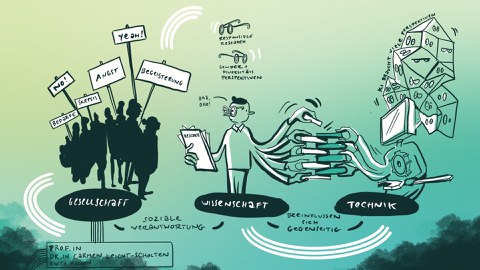Research project
Qualitative study on aspects of research culture in the field of artificial intelligence
As part of a qualitative study, explorative guided interviews on aspects of research culture in the field of artificial intelligence were conducted with developers and researchers from various disciplines. The participants are members of the Center for Scalable Data Analytics and Artificial Intelligence (ScaDS.AI) Dresden/Leipzig. CitizenScience.AI is part of its Research Area Responsible AI and consists of the two fields of action Focus on Developers and Focus on the Public. The study presented here is part of the first field of action, which aims to reflect central value-based concerns that are important for shaping our common future in AI research. The core topics in this context are gender equality, cultural diversity, sustainability and participatory justice.

Abbildung 1 Graphic Recording von ©Henrike Terheyden zum Impuls von Prof.in Carmen Leicht-Scholten, Symposium in der Motorenhalle Dresden am 10.11.2023 zum Thema: ‚Hoffnung in der Klimakrise? Künstliche Intelligenz im Kontext von ökologischer Nachhaltigkeit und sozialer Verantwortung‘
The collaboration with Carmen Leicht-Scholten from RWTH Aachen University as part of an event in 2023 provided important impetus for the creation of the interview guidelines. One of her key statements is that citizen participation is the key factor in driving transformations towards sustainable and socially responsible solutions. (Leicht-Scholten, 2023) Our first key question is therefore:
"To what extent do researchers in the field of AI agree with this thesis and to what extent do they see the possibility of involving societal stakeholders in research processes?"
In the sense of a sustainable technology assessment, as formulated by Jonas as early as 1979, researchers ideally adopt the perspective of users in order to take responsibility for their own development. (cf. Jonas, 1979, p.96). In this context, Russell asks himself what a world would look like in which AI technology resulting from his own research exists. (cf. Russell, 2020, Chapter 3) Our second key question is therefore:
"To what extent are AI technologies already reflected in basic and applied research here on the ground in terms of values?"
Theoretical embedding
Active reflection on personal experiences in the context of one's own research activities ideally triggers learning processes. Accordingly, every open discussion can be an intervention. The central starting point is a constructivist view of human nature. According to this view, learning is an active construction process in which people are irritated in their learning processes and thus encouraged to deal intrinsically with various topics. (cf. Siebert, 2011, p.90)
"You cannot teach a man anything, you can only help him to discover it in himself." (Galileo Galilei)
Methodological approach
The two core questions discussed above regarding the involvement of social stakeholders and the value-based reflection of modern AI technologies represent a significant momentum in the development of the interview guidelines. The guidelines were created in the course of 2023 using the SPSS method according to Helfferich. (cf. Helfferich, 2011, p.182ff.) To test the survey instrument, five pretests were carried out in December 2023 with different ScaDS.AI members with reference to the think-aloud method. (cf. Schnell et al., 2011, p.340ff.) A quota-based procedure was chosen for the sample selection. This was to ensure that the input came from different status groups and research areas. The participants were diverse in terms of gender, status and nationality. A total of eight interviews were conducted in the survey phase from February to April 2024. The pre-transcriptions were first made using the dictation function of Word Office 365 and then transcribed using the extended content-semantic transcription according to Dresing & Pehl.
The evaluation will focus on the extent to which the core themes of CitizenScience.AI are reflected in basic and applied research.
The method of circular deconstruction according to Jaeggi will be applied. The transcripts are taken apart in a circular manner and reassembled from different points of view, so that initially inconspicuous meanings gradually become apparent. (cf. Jaeggi et al., 1998, p.6) Individual professional expertise as well as personal experiences and attitudes are to be opened up and made visible. The results are fed back within the Research Area Responsible AI of the ScaDS.AI.
Bibliography
Jonas, Hans. 1979. The principle of responsibility. Frankfurt am Main: Insel-Verlag.
Dresing, Thorsten & Pehl, Thorsten. 2018. practice book interview, transcription & analysis. Instructions and rule systems for qualitative researchers. (8th edition). Available at: https://www.audiotranskription.de/wp-content/uploads/2020/11/Praxisbuch_08_01_web.pdf [16.05.2024]
Helfferich, Cornelia. 2011. The quality of qualitative data. Manual for conducting qualitative interviews. (4th edition). Wiesbaden: Springer VS.
Jaeggi, Eva, Faas, Angelika & Mruck, Katja. 1998. There are no bans on thinking! Proposal for the interpretative evaluation of communicatively obtained data (2nd revised version). Research report from the Department of Psychology in the Institute of Social Sciences at the Technical University of Berlin, No. 98-2.
Russell, Stuart. 2020 [2019]. Human Compatible: artificial intelligence and how humans retain control over superintelligent machines. mitp Verlag. Available at: https://learning.oreilly.com/library/view/human-compatible/9783747501757/ [16.05.2024].
Schnell, Rainer, Hill, Paul B. & Esser, Elke. 2011. methods of empirical social research. (9th edition). Munich: Oldenbourg Wissenschaftsverlag GmbH.
Siebert, Horst. 2011. theories for practice. (3rd edition). Bielefeld: Bertelsmann.
Leicht-Scholten, Carmen. 2023. Keynote speech at the symposium "Hoffnung in der Klimakrise? - Künstliche Intelligenz im Kontext von ökologischer Nachhaltigkeit und sozialer Verantwortung". Available at: https://www.gdi.rwth-aachen.de/go/id/benwkn?#aaaaaaaaabeoclx [16.05.2024]
